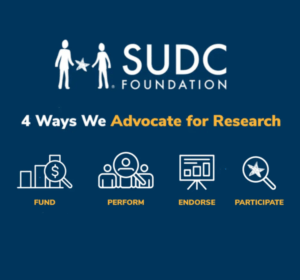21 Jul How the SUDC Foundation Advocates for Research

One of the pillars of the SUDC Foundation’s mission is to advocate for research to create a world free from SUDC. The path to producing high-quality research is long, arduous and full of many challenges related to SUDC – such as the difficulty in identifying cases of SUDC, little funding and awareness, inadequate medical training around pediatric deaths and a shortage of forensic pathologists.
But we are dedicated to advancing our mission. There are four main ways that the SUDC Foundation advocates for research:
We fund research. Through scientific research grants, the SUDC Foundation improves our understanding of SUDC. Grant applicants go through a rigorous review and approval process before receiving a grant from the SUDC Foundation. The SUDC Foundation provides grants to the SUDC Registry and Research Collaborative (SUDCRRC), a five-year study on SUDC conducted at New York University’s Langone Health. Its purpose is to further our understanding of the cause(s) and ways to prevent sudden death in children. The SUDCRRC provides families with a thorough case review of a child’s medical history and death, and provides additional testing to examine possible contributing factors and potential causes of death of the child they lost. Findings from the SUDCRRC have explained some deaths not previously understood, bringing comfort and clear knowledge to families as well as guiding clinicians in their medical management of families. You can learn more here.
Another scientific grant awarded to the National Association of Medical Examiners (NAME) by the SUDC Foundation resulted in the first ever U.S. national guidelines for the investigation of infant and child sudden deaths, their reporting and the care of affected families. NAME led this effort in coordination with the American Academy of Pediatrics (AAP) to create a first-of-its-kind book, Unexplained Pediatric Deaths: Investigation, Certification and Family Needs. The publication is a combined effort of a panel of over 30 medical examiners, pediatricians and federal agency representatives who represent the diverse interests of epidemiology, death investigation, autopsy performance, death certification, clinical subspecialties (neurology, cardiology, child abuse, injury prevention, infectious diseases, genetics and metabolic diseases), family needs, prevention and research. Adoption of these guidelines will bring us closer to achieving a better understanding of these deaths, promote successful public health prevention strategies and appropriate care of the bereaved. You can learn more here.
We perform research. The SUDC Foundation performs research to better understand and advocate for the needs of families affected by sudden child death. This research is performed by SUDC Foundation staff and volunteer researchers who have successfully completed the Collaborative Institutional Training Initiative for Biomedical Research. You can learn more about our published research here.
We endorse research. The SUDC Foundation provides letters of support to endorse related research. When researchers submit a grant application to another institution, they may ask related stakeholder organizations or experts in the field to provide a letter of support to be submitted with their application. This can be helpful in conveying to the grant agency how widespread the support is for the application. This request is put through the same rigorous review and approval process as grant applicants go through when they apply for scientific grants from the SUDC Foundation. The SUDC Foundation has provided such letters of support for high quality research that is in line with our mission.
We participate in research. We devote time to working with public working groups and other organizations whose research and advocacy complement our own efforts to improve the health of all children. Some of these partnerships include those with NAME, the AAP, the National Association of Rare Disorders (NORD), the Organization of Scientific Area Committees for Forensic Science (OSAC) and the North American Sudden Unexplained Death in Epilepsy (SUDEP) Registry to name just a few.
Our SUDC community is strengthened by working together. With our diverse partnerships and collaborations, we are working towards a shared vision. And the SUDC Foundation will continue to work tirelessly to see a future free of SUDC.
For more information on how we advocate for research and to watch our enlightening new video, please visit here.
To see a full list of SUDC-related research and articles made possible by the support of the SUDC Foundation, please visit here.


